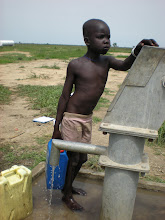
As a civil engineering intern, I spent a lot of time initially investigating local septic systems and water sources. (Not always the most glamorous of jobs)
___________(Phil and I doing the dirty work - septic tank investigation)
We tested several different wells for water quality and met with some local well drillers to learn a little about how the process works here. We also researched some septic tank designs at local schools and in the hotel at which we were staying. We all had several meeting with local officials: The Minister of Physical Infrastructure and The Minister of Education, where we learned about some requirements we need to fulfill. We anticipated there would be a few "hoops" we would need to jump through for Rebuild Sudan to aquire the land from the state, or permits etc. that would be required. But when we asked the Minister or Physical Infrastructure, His Majesty (yes, that's how he was addressed) told us "Because you come with open hearts, you can just have the land." Throughout our trip, we experienced this generosity and support in gratitude for the service that Rebuild Sudan was providing the people.
___(Danna helping some Dinka women pump water at a community well)
The interaction with the locals and these observations is the biggest reason that it is necessary travel to the country which we are serving. We could just stay in the



No comments:
Post a Comment